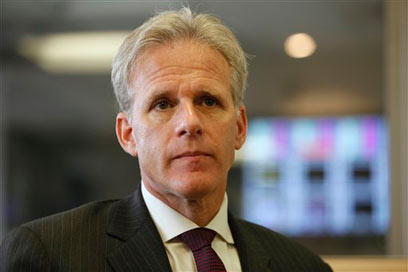_a.jpg)
Israel may lose $500 million in US aid
After Washington fiscal talks fail, new budget crisis begins. If parties fail to reach compromise, cuts may affect foreign aid as well, including military aid for development of anti-missile batteries
WASHINGTON - US President Barack Obama emerged Friday from a unsuccessful, last-minute meeting with congressional leaders declaring there was no progress on blocking what he called "dumb and arbitrary" cuts that will begin carving $85 billion of government spending by day's end.
The cuts will likely affect American citizens, but also Washington's military aid to Israel. If the crisis is not solved in a compromise reached during the 2013 fiscal year, the Jewish state stands to lose up to $760 million in security aid.
Related stories:
- Watch: Israel launches Hetz-3 missile interceptor
- 'US military aid would delay Israeli strike'
- US supplies Egypt with F-16 fighter jets
As far as the American economy is concerned, the cuts will affect the level of services, layoffs and automatic salary cuts. But the cuts may also affect US foreign aid, and Israel could gradually lose $263.5 in the coming year out of the annual military aid which amounts to more than $3 billion.

Magic Wand test. $1 million per missile (Archive photo: Defense Ministry)
Yet while the annual military aid will continue to flow into Israel, with a 3% cut, the American aid for the development and manufacturing of the Iron Dome, Arrow and Magic Wand anti-missile batteries will be stuck as long as the US defense budget for 2013 is not approved.
The expected budget for the Iron Dome rocket interception system, which is pending approval in the US Congress, stands at $210 million for 2013 as part of the four-year Iron Dome aid package of $680 million.
Israeli envoy: Ready to carry our share of burden
Apart from Iron Dome, the Congress has been working on a special aid package of $268 million for a joint Israeli-American development of Arrow and David's Sling missiles to defend Israel on different levels against ballistic missiles. Out of this sum, $100 million are guaranteed but $168 million are now in danger.
Israeli Ambassador to the US Michael Oren told Ynet in response, "As the United States' closest ally in the Middle East, Israel understands the difficult budget challenges the Americans are dealing with.
"We are ready to carry our share of the burden, while trying to maintain the projects which are crucial for Israel's security, like Iron Dome."

Israeli Ambassador to the US Michael Oren (Photo: AP)
Obama and congressional Republicans are deeply at odds over how to tackle the country's $16.6 trillion debt, and they have been battling over that issue since the opposition party regained a majority in the House of Representatives more than two years ago. The crude, across-the-board budget reductions were structured to be so unattractive that both sides would be forced to find a better deal. They haven't.
"Let's be clear. None of this is necessary," the president said. "It's a choice Republicans in Congress have made" to avoid to closing tax loopholes that benefit the wealthy. He said "the pain will be real" for the American people, but he added that the cuts aren't "the apocalypse, they're just dumb."
Possible government shutdown
Republican John Boehner, speaker of the House of Representatives, walked out of the West Wing to say there would be no compromise if Obama insisted on higher tax revenue. Republicans are standing fast against any increase in taxes and will not compromise on achieving debt reduction through spending cuts alone.
Friday's meeting was the first the two sides have held this year on the budget battle, and it lasted less than an hour. Asked whether he couldn't get the parties in a room and stay there until they reach a deal, Obama said, "I can't have Secret Service block the doorway."
The cuts are just the first of a series of budget crises that will confront Congress and the White House in the coming weeks.
Next is a possible government shutdown. The annual ritual of passing agency spending bills collapsed entirely last year, and Congress must act by March 27 to prevent the partial shutdown.
Then, in April, Congress will confront a renewed standoff on increasing the government's borrowing limit – the same the issue that, two years ago, spawned the law forcing the current spending cuts in the first place.
Failure to raise the borrowing limit could force the US to default on debt for the first time in history.

Obama and Boehner in 2011. Who will win current match (Photo: AP)
So entrenched are the two parties that chaplain Barry Black opened the Senate session Thursday with a prayer that beseeched a higher power to intervene.
"Rise up, O God, and save us from ourselves," he said.
The cuts will slice $85 billion out of spending through the fiscal year, which ends September 30. Agencies have to cut the same rough percentage of their budgets, no matter whether they are already streamlined.
The immediate impact of the cuts on the public was uncertain. They would carve 5% from domestic agencies and 8% from the Pentagon between now and October 1 but would leave several major programs alone, including the Social Security pension program, the Medicaid health care program for the poor and food stamps.
Agency leaders for weeks have warned what would happen when the cuts take effect: The busiest airports could close some runways, causing widespread flight delays and cancellations. Hundreds of illegal immigrants already have been freed from jail across the country. One military aircraft carrier's tour of duty to the Persian Gulf has been delayed.
Many conservatives are willing to accept the cuts as the only way to reduce government spending, even though the budget knife cuts into cherished defense programs.
Some Republicans held out hope the current struggle might lead to talks on completing work on the final piece of a deficit reduction package that has been more than two agonizing years in the making. The opposition party wants to overhaul the US tax law and win reductions in social safety net programs, the federal pension system and medical insurance for Americans of retirement age and health care for the poor.
Obama and some Democrats are willing to see some small alterations to those programs but nothing on the scale sought by Republicans. And the Democrats want to raise taxes on the wealthy to, in part, fund new or expanded government programs. Republicans want any increase in tax revenue to go straight toward reducing the debt.
In a cycle of crisis followed by compromise over the past two years, Obama and congressional Republicans have agreed to more than $3.6 trillion in long-term deficit savings over a decade. While much of that has come from spending restraint, Republicans allowed legislation pass late last year that raised taxes on upper-income Americans by $600 million.
- Follow Ynetnews on Facebook and Twitter
- Receive Ynetnews updates directly to your desktop










